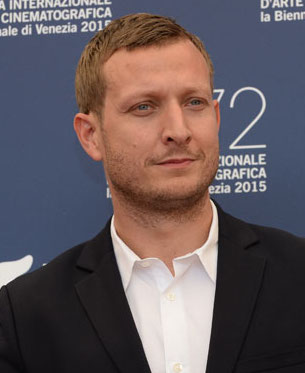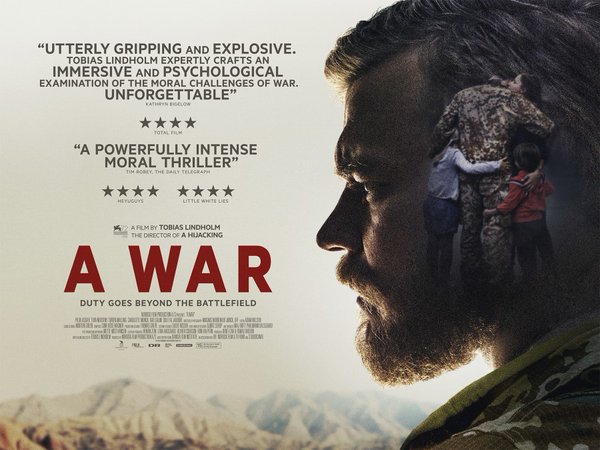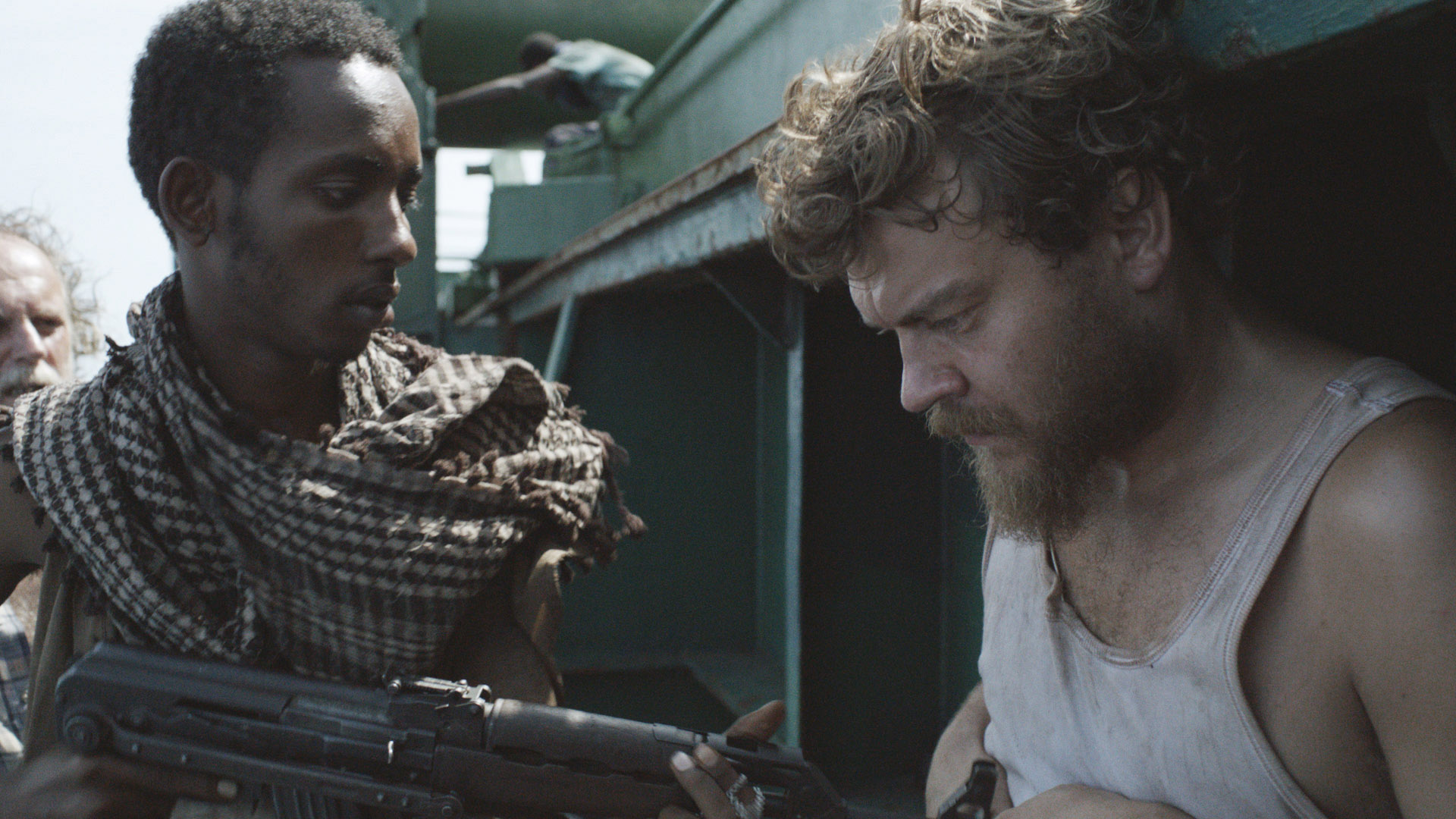Interview: Tobias Lindholm on the Oscar Nominated 'A War' and Creating Time on Film
 Friday, February 12, 2016 at 4:00PM
Friday, February 12, 2016 at 4:00PM
 Writer/Director Tobias LindholmJose here. In Tobias Lindholm’s A War, the hardest battle for Danish commander Claus M. Pedersen (Pilou Asbæk) comes not in the warzone of Afghanistan, but in a courtroom back home where he faces prison time for a tactical decision that ended the lives of civilians. A thoughtful essay on the rules of humanity during wartime, the film remains largely apolitical while still engaging audience members who might question the very nature of foreign invasions, the need for war, and our roles as humans in a world that pits us against each other. Directed with confidence by Lindholm, the film remains outside any specific genre while providing a master class in how to create tension, intimacy and thrills.
Writer/Director Tobias LindholmJose here. In Tobias Lindholm’s A War, the hardest battle for Danish commander Claus M. Pedersen (Pilou Asbæk) comes not in the warzone of Afghanistan, but in a courtroom back home where he faces prison time for a tactical decision that ended the lives of civilians. A thoughtful essay on the rules of humanity during wartime, the film remains largely apolitical while still engaging audience members who might question the very nature of foreign invasions, the need for war, and our roles as humans in a world that pits us against each other. Directed with confidence by Lindholm, the film remains outside any specific genre while providing a master class in how to create tension, intimacy and thrills.
A War has been nominated for the Best Foreign Language Film Oscar and Lindholm isn’t completely unfamiliar with the experience, having also worked as a writer in the 2012 nominee The Hunt. The versatile filmmaker is next working on yet another screenplay with Thomas Vinterberg and is also writing Paul Greengrass' next film. I had the opportunity to talk with him the day after the Oscar luncheon, and he shared his insight into creating time on film, his cinematic pet peeves and the excitement of awards season.
Our interview is after the jump...

JOSE: Both A Hijacking and A War are films divided into two different locations from which we see the characters played by Pilou Asbæk desperately try to reach out to his wife. How did you come to settle on this specific structure for both films?
TOBIAS LINDHOLM: In A Hijacking I was traveling away from home making the film and I had one kid, so the character has one kid. Now I have three kids, so the character in A War has three kids, I think that’s my emotional window to the story. When I did A Hijacking I felt there was a great energy between the two arenas of being home and also very far away, I felt we were able to, not master, but we did an effort to have that structure. We wanted to do the same thing in A War, but complicating it more by adding a trial in the end. We wanted to show how a regular man’s life can be divided into three boxes, his personal life, his professional life, and his role in democracy. He’s a soldier, a father and husband, and his role in democracy comes in the trial.
JOSE: This is probably not very politically correct of me to ask, but would you say that the act of making films is in some way similar to battle, meaning you have no idea what you’ll encounter in “battle” every day?
TOBIAS LINDHOLM:To have respect for the soldiers job, I have to say my job is very easy and not dangerous, but the idea of investing all of yourself into a project and honoring your schedule during a shoot can be similar. On the aspect of having to divide your personal and professional life I see more similarities, you go away from your family to do the job. The constant theme of the phone calls, calling home to feel close to your family, even though you’re two thousand kilometers away, and that emotional rollercoaster is something I knew very well and knew I could use in the film.

The way you use time in the film was very interesting. The scenes set in Afghanistan even though they were action packed felt like they lasted longer, while scenes in the courtroom, where the characters are “safer” felt like they were happening at regular speed. How did you convey time differently in each of these situations?
The logic of how I worked with the cinematographer was all about that, we insisted in using handheld camera in Afghanistan so it would be more dramatic and hectic. In the courtroom and with the children at home there is almost no camera movement. I wanted to show how we observe time and how we live time. It’s the hardest thing to do on film, you can always use titles to say things like “18 days later”, but to bring the emotion of how time goes by is harder. We definitely wanted to slow down time near the end of the film.
You’ve written television series before and in A War, watching the character of the prosecutor played by Charlotte Munck, who I found so intriguing, I got the impression you could’ve written entire films about each of these characters…
I think for me the key is to not tell too much. In real life when we meet strangers, let’s say I go into a courtroom and see a prosecutor, there’s something about that real person that makes me feel there is a whole life there. I remember in film school a teacher told a great anecdote, he said “if you wanna tell a story about a cow, and you go ‘yesterday I saw a cow and then I passed a bridge and went to a church’ you have immediately developed your own cow, your own bridge and your own church, because you’ve seen cows, bridges and churches, but if I give you a lot of details about my own cow, you’ll leave yours and try to understand mine, the connection on a human level is gone, and you’ve made it intellectual”, so my idea is to not tell too much. I just show a real person in her profession and I just let her be. Does that make sense?
Completely. People in your films don’t feel like they’re there to help advance the plot.
Nobody in real life is there for plot. You don’t fall in love when it suits you, you fall in love when it’s gonna make trouble. Nobody’s standing around waiting for plots to begin. We are in a world where we’re constantly in contact with new people, we enter into rooms every day, and we can read the mood of the room right away. We’ve been doing that all our life, that talent is something we should use watching films, we shouldn’t hang that talent in walls outside the theater, let’s bring it in and make use of the fact that we know how to relate to each other on a human level. We shouldn’t try to control that too much, the plot can’t be everything, put human beings in front of human beings and we will recognize each other.
I know you don’t usually give directions to non-professional actors like the hijackers in A Hijacking and the Afghan refugees and the soldiers in A War, but I wonder if these liberties you give them ever create confusion with professional actors who feel restrained by the screenplay.
Well, that’s one of the reason why I’ve worked with the same group of actors in the films I’ve done. We have a way to how we work together, when I brought Søren Malling for A Hijacking, he had to find a way to accept that he needed to stick to the script, but I would let the negotiator do whatever he wanted. In the same case in A War, once in a while I needed Pilou to help me control the scene, so he would keep the scene there and I would let the soldiers just be soldiers.
 Pilou Asbaek also worked with nonprofessional actors in "A Hijacking"
Pilou Asbaek also worked with nonprofessional actors in "A Hijacking"
You’re outspoken about how interested you are in conveying reality in your films, and how so many conventions in movies are so fake. For example you mentioned that interviews in real life rarely happen in pristine meeting rooms, and let me tell you trying to find a quiet spot in NYC for this phone conversation made me think of that. So, if you could dispense of one or two movie conventions for good, which would they be?
That’s a good question, I think the big problem of loving films is that when you start making films it ruins your experience, you don’t enjoy it as much! I watch classics constantly because I can enjoy those, but really I feel that if we can make sure that the characters have lives and stuff going on, and they’re not just waiting to remind us where we are in the plot, but they have a sense of real life, I would appreciate that a lot. I think we see way too many stereotypes, too many unintelligent women and too many masculine, violent men in movies. The world is more complex and I would love to get rid of the idea that there are certain things a woman or a man can and can’t do. We are way too conservative about that, we have not been liberated from our understanding of the world since the 1950s in many ways.
Are you excited or nervous about the Oscars? Or is it just another day in your life?
(Laughs) It’s definitely not just another day, it’s crazy and fantastic. The point was to make a story that could convey the point of what the troops in Afghanistan went through, but the international attention and being on the mainstage is such a great joy. It’s a magical journey. I’m enjoying every minute and then looking forward to going back to my office in the beginning of March and get to work again.

A War opens in theaters today.
more interviews | more Pilou Asbaek | more Scandinavian film
Oscar's Foreign Film Competition
 A War,
A War,  Oscars (15),
Oscars (15),  Pilou Asbaek,
Pilou Asbaek,  Scandinavia,
Scandinavia,  Tobias Lindholm,
Tobias Lindholm,  foreign films,
foreign films,  interview
interview 


Reader Comments (1)
Jose - interesting article, thank you. Ever since I watched Borgen I have taken an interest in certain cast members. Pilou Asbaek is going to be on Game of Thrones this season, so I expect more people will be taking note of both " A War" and "A Hijacking".
So far I have only seen "Son of Saul" of the foreign language entries - looks like I have some catching up to do.